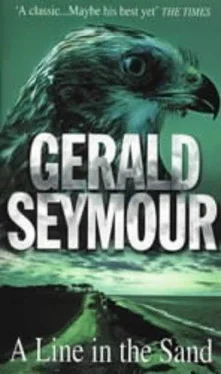Gerald Seymour - A Line in the Sand
Здесь есть возможность читать онлайн «Gerald Seymour - A Line in the Sand» весь текст электронной книги совершенно бесплатно (целиком полную версию без сокращений). В некоторых случаях можно слушать аудио, скачать через торрент в формате fb2 и присутствует краткое содержание. Жанр: Триллер, на английском языке. Описание произведения, (предисловие) а так же отзывы посетителей доступны на портале библиотеки ЛибКат.
- Название:A Line in the Sand
- Автор:
- Жанр:
- Год:неизвестен
- ISBN:нет данных
- Рейтинг книги:3 / 5. Голосов: 1
-
Избранное:Добавить в избранное
- Отзывы:
-
Ваша оценка:
- 60
- 1
- 2
- 3
- 4
- 5
A Line in the Sand: краткое содержание, описание и аннотация
Предлагаем к чтению аннотацию, описание, краткое содержание или предисловие (зависит от того, что написал сам автор книги «A Line in the Sand»). Если вы не нашли необходимую информацию о книге — напишите в комментариях, мы постараемся отыскать её.
A Line in the Sand — читать онлайн бесплатно полную книгу (весь текст) целиком
Ниже представлен текст книги, разбитый по страницам. Система сохранения места последней прочитанной страницы, позволяет с удобством читать онлайн бесплатно книгу «A Line in the Sand», без необходимости каждый раз заново искать на чём Вы остановились. Поставьте закладку, и сможете в любой момент перейти на страницу, на которой закончили чтение.
Интервал:
Закладка:
"I'll be in my car, Mr. Perry."
Perry said, in a low voice, "My wife knows, the boy does not."
"That's not a problem. We'll let him get off to school, then we'll talk."
"He's being picked up, the school-run, in about five minutes."
"You know where to find me, Mr. Perry."
There was a shout from the kitchen, from the woman, about the door being open. Who was there? Perry turned and yelled back into the depth of the house that he wouldn't be a moment. There was defiance in his face; there usually was at the start from the principals.
"I'll see you in a few minutes, Bill…"
"Detective Sergeant or Mr. Davies, please, and you are Mr. Perry and your wife is Mrs. Perry it's the way we do it." He said it brusquely, coldly. There wasn't call in the job for familiarity. What they said at the Yard, in the SB protection unit, get too close and the principal starts to run the show. That would not happen with Bill Davies's principal. He had a job to do, he was a paid hand, and it mattered not a damn whether he liked or disliked the man. He would tell him later about the workmen and the technicians, who would be crawling round the house by late morning, up the walls, through the rooms, in the garden. There was no soft way of making a start.
"The neighbours don't know."
"No reason why they should we're used to discretion. The less they know the better."
Perry frowned. He was a moment summoning up the question, then rushed it.
"Are you armed?"
"Of course."
"Has the situation got worse?"
"The doorstep isn't the place to discuss it. When you're ready, come and get me out of the car."
The door closed on him. Of course he was bloody armed. Perry would have said all the brave things when the Thames House people had come on their visit and been rejected. Now, he would be realizing where the brave things had led him.
Davies sat in his car. He had a good view of the house, and the green in front of it, the road and the homes on the far side of the house, the sea. The car was from the pool. It looked like any other Vauxhall sold for company fleet driving, but it had the big radio with a pre-set console linking Davies to the SB's operations centre, a fire extinguisher, and the box with the comprehensive first-aid equipment. In a metal container, reached by lifting the rear seat central arm rest, was a compact case holding a Heckler amp; Koch machine-gun, with ammunition and magazines, and a dozen CS gas grenades. In the boot was an image-intensifier sight for the
H amp;K, a monocular night-sight, a bullet-proof square of reinforced material, which they called the ballistic blanket, the gas masks and the television monitor with the cables and the headset.
Bill Davies waited. By his feet was the lunch-box given him by Mrs. Fairbrother at the bed-and-breakfast, and his Thermos, which she had filled with coffee black, no sugar. He had discarded the shoulder holster, left it locked in his bag in the room, gone for the waist-belt holster and put his loose change into his suit-jacket pocket; weight in the pocket so that the jacket moved decisively back if he had to draw his firearm fast. He saw the neighbour leave for work with his wife, bustling out of his weathered, brick-built house, before stopping and peering at him as he sat in the car. Finally, the child ran from the house and into a car.
From the doorway, Perry waved for him to come inside. Davies, of course, had a trained eye for descriptions: Perry was of average height, average build, with fair hair and a face with no particular distinguishing marks. He was ordinary and unremarkable, the sort of man who was easy to miss in a crowd.
He took his time, straightened his tie and checked in the mirror that his hair was in order, then eased out of his seat. He didn't hurry. He was not there to be at the beck and call of the principal. The Glock in the waist holster lapped against his hip as he walked towards the door. He would set the rules, start as he meant to go on. He went inside.
Perry said softly, "I told my wife that the threat wasn't real."
"Then you'll have to do a bit of explaining, sir."
When the engine pitch changed he was sleeping. He stirred in the hard bunk bed, closed his eyes again, aware of the swinging turn of the tanker. Then he wiped his eyes, dragged at the floral curtain and peered through the porthole window. Beyond white-flecked sea was a horizon of dark land, browned cliffs, yellowed fields and the greys of a town's buildings. In the sea, bucked and heaved by the swell, was a small boat, its blue hull lost then found as the spray broke over a garish orange superstructure. The small boat closed on the tanker. He was awake, he remembered.
The tanker slowed to allow the pilot's launch to come alongside, turning to shelter it from the bluster of the wind. He pressed his face against the weathered glass of the porthole and watched until the launch was under the sheer wall of the tanker's side. He imagmed the pilot jumping across a void of water from the deck of his boat to the rope ladder cavorting from the bottom of the fixed steps, and if the pilot slipped… In the night, when he went over the side, his God would protect him. From his porthole window, he could not see the pilot come aboard, but he watched the small boat heave away and head back at speed towards the land. He felt the turn of the tanker and heard the throbbing power as the engines regained cruising speed. By the time that the ship, guided by the pilot on the bridge with the master, rejoined the northern lane of the English Channel's traffic-separation scheme, he was asleep again. He needed the sleep because he did not know when next he would have the opportunity. He would sleep until the alarm on his watch woke him at noon, then pray, then sleep again until mid-afternoon, then pray, then sleep again until dusk, then pray, then ready himself.
"They bought it I don't believe it, but it's authorized." The faithful Mary-Ellen tore the paper off the fax roll.
"That's just incredible. They swallowed it. You've got the clearance, you're on the freedom bird tonight." She laid the sheet of paper down in front of him.
"Have you enough socks?"
The Special Agent (Riyadh) of the FBI and his personal assistant sat beside each other and made a list of what he should pack, and what he might need to buy in the embassy shop. She wrote down, and underlined, the names of the pills for his blood-pressure problem.
When the list was complete, she made the airline reservation.
"The authorization is for a week is that OK? Book you back in a week?"
He nodded agreement.
She chattered on, "Don't you worry about me. I'll be just fine. Be glad to see the back of you for a week. We're behind with accounts, filing, all that stuff might just get the place cleaned out. I'll have a dandy time here."
But he was hardly listening. Duane Littelbaum would not have paused to consider whether his personal assistant could cope with a week of his absence. His wife, Esther, was out in west Iowa, between Audobon, which had been his home, and Harlan Valley, where she had been reared. She was in the world of cattle and corn, had brought up two daughters, and he hadn't lived with her, not properly, for a few months short of twenty-one years. It did not seem to matter to him, or to her. He went home, to the roadside house between Audobon and Harlan Valley, every leave that was given him and every Christmas. He wrote to his wife each weekend that he was away and never forgot a birthday. It was a detached marriage but it stayed alive.
He had lived his life for the study of Iran.
Those who did not know him, the embassy staffers who passed him in the corridors or saw him in the parking lot or at the ambassador's functions, would have reckoned him an academic, eccentric and gentle. They would have been wrong. He played the dangerous game of counter-terrorism. It was a solitary, work-driven life, where victims held little relevance, where the requirement for victory was paramount.
Читать дальшеИнтервал:
Закладка:
Похожие книги на «A Line in the Sand»
Представляем Вашему вниманию похожие книги на «A Line in the Sand» списком для выбора. Мы отобрали схожую по названию и смыслу литературу в надежде предоставить читателям больше вариантов отыскать новые, интересные, ещё непрочитанные произведения.
Обсуждение, отзывы о книге «A Line in the Sand» и просто собственные мнения читателей. Оставьте ваши комментарии, напишите, что Вы думаете о произведении, его смысле или главных героях. Укажите что конкретно понравилось, а что нет, и почему Вы так считаете.












